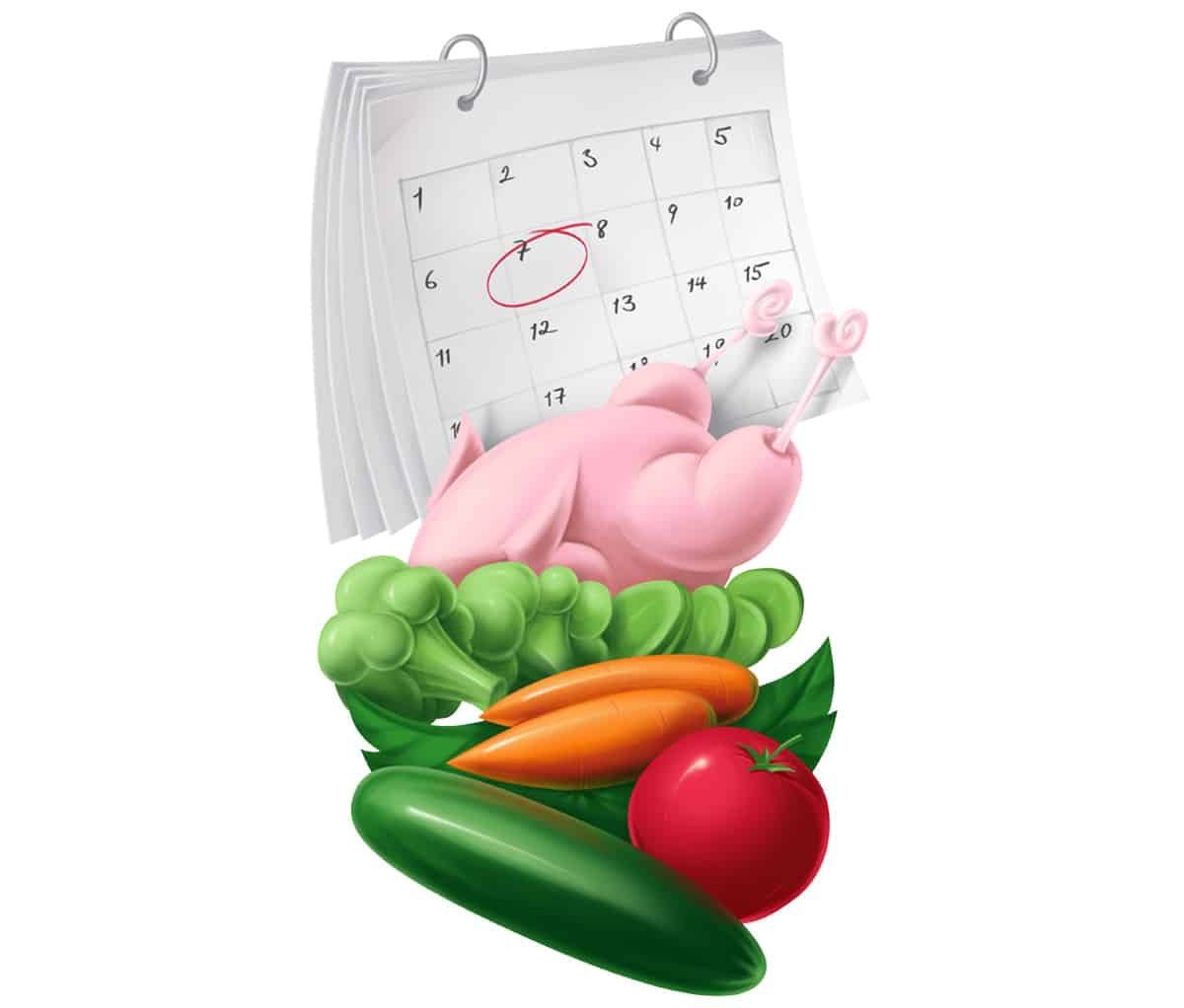We’ve covered some tips for saving time with Paleo grocery shopping here, but in this post, the focus is more on two different grocery-shopping goals:
- Saving money (without compromising the quality of the food you buy)
- Resisting the temptation to impulse-buy junk food
Saving money and resisting junk food are two different goals, but they’re actually pretty closely related. For one thing, impulse-buying junk food is what breaks a lot of people’s budgets. More generally, there's a common behavioral problem in both cases. A lot of people say they want to save money and avoid buying junk food, but then in practice they end up spending more than they budgeted and buying a lot of unhealthy treats - and they’re not totally sure how it happened.
Well, here’s a look at the science of grocery-store behavior to help you conquer both of these problems. Instead of tips for shopping sales and clipping coupons, we’re looking at scientific research on consumer psychology to see how people can resist impulse spending and bad grocery decisions. Here's a look at the well-known (but worth restating) principles of decision-making, a counterintuitive planning strategy, and a techno-fix.
The Well-Known (But Worth Restating): Research on Decision Fatigue
Making decisions is cognitively difficult - this is true if the decision is totally neutral (red shirt or blue shirt) but it’s especially true if the decision involves resisting temptation or exerting self-control. “Decision fatigue” is the way that people get tired after making a lot of decisions. There’s a ton of research on decision fatigue if you’re interested in this, but the short version is that it’s very hard to resist temptation to buy something that’s out of your budget or off your diet plan when your brain is worn out from making a bunch of decisions already.
Grocery stores are full of decisions to make. You can easily wear yourself out making decisions by the end of your trip - why you think they put all the candy at the checkout, the last place in the store that you visit?
The solution to this is to make the decisions beforehand as much as possible.
Research shows that decision-making is the hard part of good grocery-shopping decisions.

It probably wouldn’t surprise you to learn that when researchers provide all the food in a study diet, people do pretty well at sticking to the diet. After all, if someone gave you a free healthy breakfast, lunch, and dinner every day, you’d probably eat it, too!
But take a look at this study. The researchers gave some people healthy pre-prepared meals; other people got structured meal plans and grocery lists and had to make those same healthy meals from scratch. The meal plan/grocery list group had to go out and buy their own food, but they didn’t have to make any decisions about it - they just had to follow the plan. Both groups did equally well and lost the same amount of weight.
In other words, the researchers found that taking the decision-making out of grocery shopping makes it easy to stick to a diet plan. That study is backed up by other research showing that pre-planning is a huge factor in avoiding expensive impulse purchases.
These studies show how to defeat decision fatigue: manage it before it happens. Plan your grocery trips to prevent in-store decisions as much as possible. Do all your fatiguing grocery planning beforehand (when you’re not actually looking at/smelling the food you’re trying to resist) and then show up to the store with a specific, itemized list and follow it. (“Dinner” is not a specific list item. “2 zucchini, 1 bag onions, 1 lb. pork chops, and olive oil” are specific list items.)
This will save your cognitive energy so you can use it all to resist temptation instead of wasting it on decisions about what kind of laundry detergent to buy or what size paper towels you need. If you’re worried that you might lose out on a sale or special offer by robotically following your list, look up the sales as you make the list! This is the 21st century and we have the internet now; there’s no need to physically be in the store to see what’s on sale.
The Counterintuitive: Research on Shopping More Often (With a Smaller Budget)
Especially in the US, it’s very common for people to make a weekly shopping trip and buy everything at once. A lot of people assume that shopping once a week is ideal because it gives you only one chance every week to impulse-grab something you don’t need - but that might not actually be the case. Shopping more frequently, with a smaller budget, may actually nudge people to buy more fresh produce and spend less on impulse buys.
More frequent shopping = more vegetables?

This study set out to test that assumption and found that people who shopped more frequently actually bought more nutritious food. When the authors tried to explain this, they suggested that people who shop more frequently are probably OK with buying more perishable things, like fresh produce. If you only shop once a week, you might be afraid that fresh vegetables will go bad in the fridge by the end of the week. But if you go 2-3 times a week and only get enough for the next few days, there’s nothing to worry about.
Smaller shopping trips = fewer impulse buys?
This team of marketing researchers set out to see why people make “unplanned purchases,” aka impulse buys. They found that people judged their impulse buys relative to the total amount they expected to spend.
- If people set out with a small budget (“I’m going to spend $10 because I just need a bag of spinach and some chicken”), impulse-buying a $10 box of Paleo cookies seemed like a lot of money in comparison.
- If people set out to do a mega-shop, expecting to spend $200 or even more for a whole week of groceries for the family, impulse-buying that same box of cookies seemed like nothing.
In the end, the people who set out to do mega-shops ended up spending more on impulse buys because they’d already given themselves permission to spend a lot of money, so adding $5 or $10 here and there didn’t feel big to them. Also, the longer people spent in the store, the more tired they got and the more likely they were to make impulse purchases (this goes back to decision fatigue and minimizing it)
All of this suggests that making smaller, shorter grocery trips with a planned small budget (again: planning!) might nudge you into buying more produce and help you avoid racking up a lot of impulse buys without realizing it.
The Techno-Fix: Research on Online Shopping
Anecdotally, everyone knows that shopping when you’re hungry or tired is a bad idea. This is supported by research finding that people really do buy more junk food when they’re hungry. But in real life, people have schedules and sometimes the only time you can squeeze in a trip to the store is on Friday after work - when, you guessed it, most people are hungry and tired.
Enter online shopping: the internet doesn’t close at night and you don’t have to make time to actually physically be anywhere, so it’s easier to schedule shopping for a time when you’re all set to make good decisions.
This study confirmed the benefits of buying food online. The researchers found that online shopping reduced “vice purchases” - things that people knew were unhealthy or over their budget but felt tempted to buy anyway.
Pick What Works for You
The big concept here is to reduce expensive and unhealthy impulse buys so you can save money and avoid bringing junk food back to your house. To make that happen, you need a plan.
If you go to a physical grocery store, the plan might be a shopping list that reduces the number of decisions you need to make. If it works for your schedule, several shorter shopping trips - with planned budgets - might be a useful nudge to buy more fresh produce and less expensive junk. Or your “plan” could be to cut out the store completely and do it online, when you can make decisions at the best time for you.





Leave a Reply